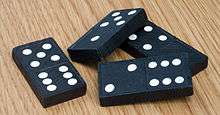Definify.com
Webster 1913 Edition
Domino
Dom′i-no
,Noun.
pl.
Dominos
or (esp. the pieces for a game)
Dominoes
(#)
. 1.
A kind of hood worn by the canons of a cathedral church; a sort of amice.
Kersey.
2.
A mourning veil formerly worn by women.
3.
A kind of mask; particularly, a half mask worn at masquerades, to conceal the upper part of the face. Dominos were formerly worn by ladies in traveling.
4.
A costume worn as a disguise at masquerades, consisting of a robe with a hood adjustable at pleasure.
5.
A person wearing a domino.
6.
pl.
A game played by two or more persons, with twenty-eight pieces of wood, bone, or ivory, of a flat, oblong shape, plain at the back, but on the face divided by a line in the middle, and either left blank or variously dotted after the manner of dice. The game is played by matching the spots or the blank of an unmatched half of a domino already played
Hoyle.
Webster 1828 Edition
Domino
DOMINO
,Noun.
Definition 2026
dominó
dominó
Hungarian
Noun
dominó (plural dominók)
Declension
| Inflection (stem in long/high vowel, back harmony) | ||
|---|---|---|
| singular | plural | |
| nominative | dominó | dominók |
| accusative | dominót | dominókat |
| dative | dominónak | dominóknak |
| instrumental | dominóval | dominókkal |
| causal-final | dominóért | dominókért |
| translative | dominóvá | dominókká |
| terminative | dominóig | dominókig |
| essive-formal | dominóként | dominókként |
| essive-modal | — | — |
| inessive | dominóban | dominókban |
| superessive | dominón | dominókon |
| adessive | dominónál | dominóknál |
| illative | dominóba | dominókba |
| sublative | dominóra | dominókra |
| allative | dominóhoz | dominókhoz |
| elative | dominóból | dominókból |
| delative | dominóról | dominókról |
| ablative | dominótól | dominóktól |
| Possessive forms of dominó | ||
|---|---|---|
| possessor | single possession | multiple possessions |
| 1st person sing. | dominóm | dominóim |
| 2nd person sing. | dominód | dominóid |
| 3rd person sing. | dominója | dominói |
| 1st person plural | dominónk | dominóink |
| 2nd person plural | dominótok | dominóitok |
| 3rd person plural | dominójuk | dominóik |
